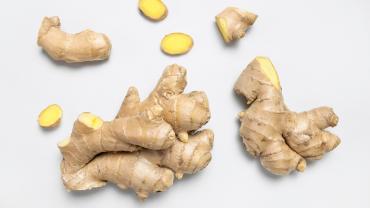
When thinking of ginger (Zingiber officinale), one typically associates it with being a flavorful, potent culinary spice to enhance a meal rather than an herb that could potentially support muscle health. However, recent research suggests that ginger may have the ability to promote healthy muscle recovery following physical activity and support athletic performance in adults.
Delayed-onset muscle soreness (DOMS) is a condition characterized by pain, inflammation, swelling, and a decrease in function and range of motion resulting from strenuous physical activity, particularly activities that are eccentric or unfamiliar to the body. Human studies have demonstrated that ginger may help promote healthy inflammatory and pain responses, potentially helping to mitigate the effects of DOMS. Furthermore, ginger "might be useful for maintaining endurance capacity in the recovery phase during intermittent exercise, such as during athletic competitions."
A systematic review of 16 clinical trials investigated the potential benefits of ginger in promoting athletic performance and muscle recovery. Although more robust clinical trials are needed, the researchers suggest that ginger supplementation over a period of one to two weeks may support healthy muscular pain responses to eccentric resistance exercise and prolonged running, especially in untrained individuals.
Further studies suggest that ginger may support muscle recovery after jogging or running. In a small randomized controlled trial (n = 20), college student-athletes who received 2.2 g/day of ginger root supplementation for five days experienced reduced jogging-related soreness after a 20 to 22-mile training run compared to those receiving a placebo. A randomized, double-blind, placebo-controlled trial of 32 runners (10 women and 22 men) consumed ginger root supplementation or a placebo for five days while performing a 40-minute downhill run on the third day of the experiment. The runners who received ginger supplementation demonstrated moderate beneficial effects in mitigating running-induced soreness or running-related DOMS.
Ginger may also help to mitigate DOMS resulting from high-intensity resistance exercise. In a study of 20 non-weight trained participants, those who received ginger supplementation for five days before performing high-intensity elbow flexor eccentric exercises to induce muscle damage exhibited accelerated recovery of muscle strength compared to those receiving a placebo.
The exact mechanism by which ginger supports muscle recovery and function is still under investigation. Rodent models suggest that ginger enhances skeletal muscle glycogen storage and exercise performance and endurance capacity through the upregulation of fat oxidation. Human studies primarily attribute the clinical benefits of ginger to its potential ability to support healthy inflammatory and pain responses.
In summary, ginger may help facilitate healthy muscle recovery, thereby supporting overall athletic performance and potentially helping support the body from the effects of delayed-onset muscle soreness. However, larger human clinical trials are necessary to delve further into this topic before any conclusions can be drawn.
By Danielle Moyer, MS, CNS, LDN